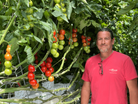Sustainability and AgriTech Fuel Indoor Farming Boom

The global indoor farming market, valued at US$27.52bn in 2024, is expected to reach US$45.53bn by 2029, according to Spherical Insights, the market research and consulting firm.
This rapid expansion is fuelled by increasing demand for locally-grown, pesticide-free produce and the need to address food security in urban areas.
Indoor farming is a concept that emerged in the 1970s. It involves hydroponic systems that grow plants without soil, using nutrient-rich water solutions. Today it is a sophisticated industry that is witnessing a surge in technological advancements and corporate interest, driven by concerns over food security, climate change and urbanisation.
Technological innovations driving global indoor farming growth
Today, the indoor farming industry is experiencing a technological shift, with AI, machine learning and advanced LED lighting systems optimising growing conditions. As indoor farming technology evolves, industry giants like Bowery, a US-based vertical farming company specialising in indoor-grown produce, and Village Farms International, the Canadian greenhouse grower, are among those leading the charge in sustainable agriculture.
Aeroponics is projected to see the highest growth rate. This is a soil-free cultivation method, where plants grow in a mist, enhancing nutrient absorption and maximising space efficiency indoors,
But hydroponics remains the dominant growing method, and accounts for the largest market share. This is a well-established soil-free growing method that uses nutrient-rich water to optimise plant growth in controlled indoor farming environments.
Companies like Signify (formerly Philips Lighting), a Dutch multinational corporation and global leader in lighting technology, are leading the charge in horticultural lighting solutions, developing specialised LED systems for indoor farming.
These solutions are crucial to the indoor farming market as they provide customised light for different crops, energy-efficient illumination, year-round cultivation capabilities and support for vertical farming techniques.
The global LED grow light market is expected to see significant growth, with projections indicating a substantial increase in market value by 2032.
Corporate giants investments and regional dynamics
Major corporations are recognising the potential of controlled environment agriculture.
Walmart, the world's largest retailer, has invested significantly in vertical farming to ensure a consistent supply of fresh produce for its stores. It invested in indoor vertical farming, taking a stake in Plenty Unlimited as part of a US$400m funding round in 2022.
Similarly, Kroger, one of America's largest supermarket chains, has partnered with indoor farming companies like Acres Farms to supply fresh produce to its stores.
Regionally, Europe held the largest market share in 2023, with countries like the UK and Germany being early adopters of farming technologies.
However, emerging economies such as India, China, and Singapore are observing substantial growth in the adoption of indoor farming technologies, driven by rising disposable incomes and increasing urban populations.
The market is characterised by a high level of merger and acquisition activity, as leading players seek to consolidate their positions in this rapidly growing sector. While market concentration exists among established companies, the industry remains dynamic, with opportunities for new entrants and disruptive technologies.
As David Rosenberg, co-founder and CEO of AeroFarms, a vertical farming company, puts it: "Indoor farming is not just about growing food; it's about reimagining our entire food system. We're on the cusp of an agricultural revolution that will transform how we produce, distribute, and consume food globally."
--------------
Make sure you check out the latest news at Food Digital, a BizClik brand




